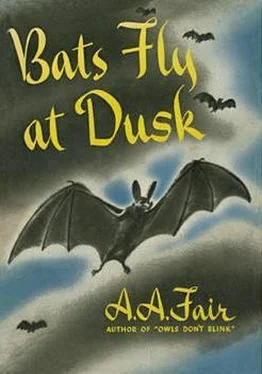A blonde girl about twenty-seven with deep-blue eyes, smiling lips, and a slightly upturned nose, sat in a chair the window. She was attired in a silk negligee. Her ankles were crossed on a pillow placed on another chair in front her. She was reading a book with every evidence of enjoyment, but looked up with a start as Bertha entered the room, letting Bertha have the benefit of the large, deep-blue eyes.
“You startled me.”
“I knocked,” Bertha explained.
“I was interested in this detective story. Do you ever read them?”
“Once in a while,” Bertha said.
“I never have until I came to the hospital. I didn’t think I’d ever have the time, but now I’m going to become an ardent fan. I think the detection of crime is the most absorbing, the most interesting thing in the world, don’t you?”
Bertha said, “It’s all in the way you look at it, I guess.”
“Well, do sit down. Tell me what I can do for you.”
Bertha Cool dropped wearily into the cushioned chair over in the corner. “You’re Josephine Dell?”
“Yes.”
“And you’re the one who is friendly with the blind man?”
“Oh, you mean that blind man on the corner by the bank building?” the girl asked eagerly.
Bertha nodded dispiritedly.
“I think he’s a dear. I think he’s one of the nicest men I’ve ever known. He has the most sane outlook on life. He isn’t soured at all. Lots of people who are blind would shut themselves off from the world, but he doesn’t. He seems to be more aware of the world now that he’s blind than he possibly could have been when he had his eyesight. And I think he’s really happy, although, of course, his existence is very much circumscribed. That is, I mean physically and so far as contacts are concerned.”
“I suppose so,” Bertha admitted without enthusiasm.
Josephine Dell warmed to her subject. “Of course, the man was relatively uneducated and poor to start with. If he had only learned to read by touch, had started studying and given himself an education — but he couldn’t do it. He simply couldn’t afford to. He was absolutely penniless and destitute.”
“I understand.”
“Then he got lucky. He made a very fortunate investment in oil, and now he can live very much as he pleases; but he feels that it’s too late, that he’s too old.”
“I suppose so,” Bertha agreed. “You’re the one who sent him the music box?”
“Yes — but I didn’t want him to know that. I just wanted it to come to him from a friend. I was afraid he wouldn’t accept that expensive a gift from a working girl, although I can afford it now very well. At the time I started paying for it, I felt that I couldn’t.”
“I see,” Bertha said wearily. “Well, I seem to have been whipsawed all the way around. I don’t suppose you happen to know anything about the Josephine Dell who had the accident, do you?”
“What accident?” she asked curiously.
Bertha said, “The accident that took place there on the corner by the bank building about quarter to six Friday night. The man hit this young woman with his automobile and knocked her down. She didn’t think she was hurt much, but—”
“But I’m that person,” Josephine Dell said.
The sag snapped out of Bertha Cool’s back as she jerked herself rigidly erect. “You’re what?” she asked.
“I’m that girl.”
“One of us,” Bertha announced, “is nuts.”
Josephine Dell laughed, a musical, tinkling bit of laughter. “Oh, but I am. It was the most peculiar experience. This man struck me and knocked me down, and he seemed like a very nice young man. I didn’t think I was hurt at the time, but the next morning when I got up, I began to be a little dizzy and had a headache. I called a doctor, and the doctor said it looked like concussion. He advised a complete rest and—”
“Wait a minute,” Bertha said. “Did this man drive you home?”
“He wanted to, and I decided to let him. At the time I didn’t think I was hurt at all. I just thought I’d been knocked over, and felt a little sheepish about it, because — well, after all, while I was in the right, so far as the signal was concerned. I really wasn’t watching where I was going. I had some things on my mind that day, and — well, anyway, he insisted that I must go to a hospital for a check-up; and when I refused that, he said he was going to drive me home anyway.”
Bertha Cool looked as though she were seeing ghosts. “What happened?”
“Well, the man seemed like very much of a gentleman, but I hadn’t been riding with him very long before I realized he had been drinking. Then I saw he was quite intoxicated, and then the veneer of being a gentleman wore through. He started making offensive remarks, and finally started pawing. I slapped his face, got out of the car, and took a streetcar home.”
“You hadn’t told him where you lived?”
“No, just the direction to start driving.”
“And he didn’t have your name?”
“I gave it to him, but he was too drunk to remember it. I’m absolutely certain of that.”
Bertha did everything but rub her eyes. “Now,” she said, “all you need to do to make the thing completely cockeyed is to tell me that you were living in the Bluebonnet Apartments.”
“But I was — I still am. The Bluebonnet Apartments out on Figueroa. How did you know?”
Bertha Cool put her hand to her head.
“What’s the matter?” Josephine Dell asked.
“Fry me for an oyster,” Bertha said, “pickle me for a herring, and can me for a sardine. I’m a poor fish.”
“But I don’t understand.”
“Just go ahead. Tell me the rest of it.”
“Well, that’s about all there is to it. I got up the next morning and felt dizzy. I called the doctor, and he suggested I should take a complete rest. I didn’t have any money on hand, but I had a little money coming. I thought that perhaps I could arrange something so I could— Well, I knew that Mrs. Cranning, the housekeeper, had a housekeeping fund from which she paid bills; and I thought perhaps I could get a little salary advance on that. I suppose I should tell you the man I was working for had died rather suddenly—”
“I know all about that,” Bertha said. “Tell me about the money angle.”
“Well, I went to Mrs. Cranning, and she didn’t have enough to spare to enable me to do just what I wanted to do, but she told me to go in and lie down and she’d see what she could do. Well, she certainly did a splendid job. The insurance company made a perfectly splendid adjustment.”
“And what did it do?”
“They agreed with my doctor that what I needed was a complete rest for a month or six weeks, and that I should go to some place where I wouldn’t have a thing in the world to worry about, where I wouldn’t have any of my old contacts or associations to bother me. My employer had died, and I was going to be out of a job, anyway. Well, the insurance company agreed to send me here, pay every cent of expenses, give me my salary for the two months I was here. When I left, they were to give me a cheque for five hundred dollars and guarantee to find me a job. Isn’t that generous?”
“Did you sign anything?” Bertha asked.
“Oh yes, a complete agreement — a release I guess it’s called.”
Bertha said, “Good God!”
“But I don’t understand. Can’t you tell me what’s the matter? What I’m telling you seems to distress you.”
“The insurance company,” Bertha said, “was the Inter-mutual Indemnity Company, and the agent was P. L. Fosdick?”
“Why, no.”
“Who was it?” Bertha Cool asked.
“It was an automobile club. I’ve forgotten the exact name of it, but I think it was the Auto Parity Club. I know the agent’s name was Milbran. He’s the one who made all the arrangements.”
Читать дальше









